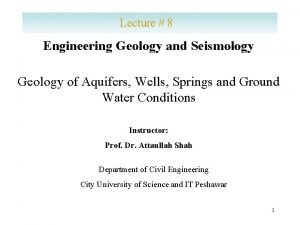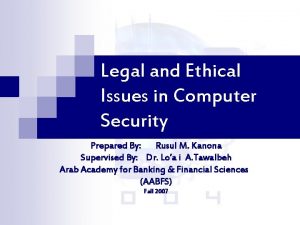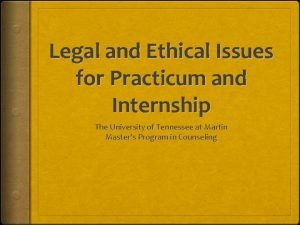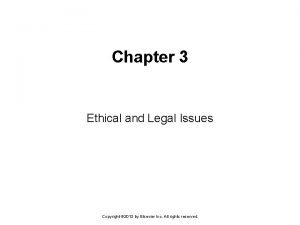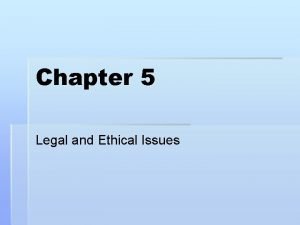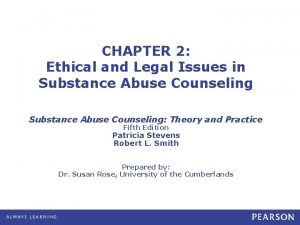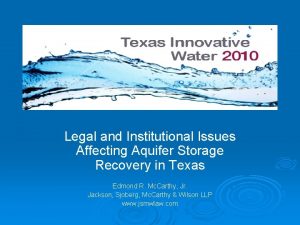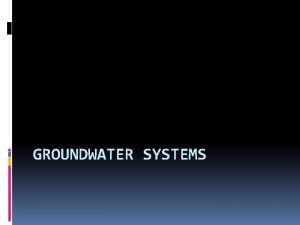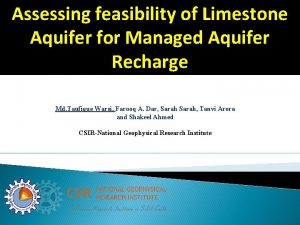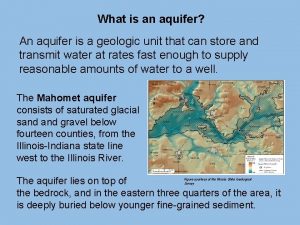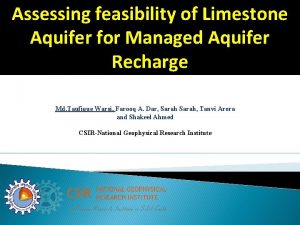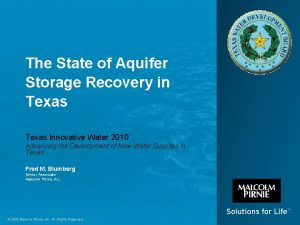Legal and Institutional Issues Affecting Aquifer Storage Recovery




















- Slides: 20

Legal and Institutional Issues Affecting Aquifer Storage Recovery in Texas Edmond R. Mc. Carthy, Jr. Jackson, Sjoberg, Mc. Carthy & Wilson LLP www. jsmwlaw. com

What Is ASR? Ø Injection of water into an aquifer through a well bore for temporary storage and, subsequently, recovering the water through the same or an other well bore. Ø Hybrid – using a settling basin to allow the water to percolate into the aquifer for temporary storage and, subsequently, recovering the water through a well bore.

Current Texas Law does not define “ASR”

Related Texas’ “legal definitions” Ø 30 TAC § 297. 1(5) Aquifer Storage and Retrieval Project - A project with two phases that anticipates the use of a Class V aquifer storage well, as defined in '331. 2 of this title (relating to Definitions), for injection into a geologic formation, group of formations, or part of a formation that is capable of underground storage of appropriated surface water for subsequent retrieval and beneficial use. …

Ø 30 TAC § 331. 2(8) Aquifer storage well-A Class V injection well used for the injection of water into a geologic formation, group of formations, or part of a formation that is capable of underground storage of water for later retrieval and beneficial use.

ASR vs. Aquifer Recharge Ø “Intent” is the critical distinction between Intent to “Store” vs. Intent to “Recharge” Storage contemplates plans to recover the injected water for beneficial use Recharge may or may not include plans to recover and beneficially use the water

Why ASR vs. Alternatives? Ø Conservation Ø New Reservoirs Ø Groundwater Ø Reuse Ø Cloud Seeding Ø Out of state importation Ø Desalination

Legal History of ASR in Texas Ø Late 1980 s UGRA files for ASR “storage” Ø 1995 – Court of Appeals upholds UGRA permit Ø 1995 – Legislature enacts HB 1989 codifying the use of ASR for surface water

UGRA‘s Permit Ø Large conventional reservoir Ø Substantial impacts to Hill Country habitat Ø Significant permitting & construction time Ø Substantial cost - $35 M (1990 dollars) Ø ASR – 1 acre pad site Ø ASR – minimal impact to habitat Ø ASR – 5 years including court appeals Ø ASR – $7 M including court appeals

Court decision – key points - ASR storage incidental to beneficial use Change in character/Ownership issues do not effect beneficial use Inability to control water not an automatic flaw if recoverability can be shown City ordinance and well location helped Evidence demonstrated beneficial use possible Water is “fungible” – same molecule rule

HB 1989 - - Authorized surface water to be stored using ASR (Texas Water Code §§ 11. 15311. 155) Encouraged “pilot projects” around the state Required compliance with affected GCD Required cooperation with affected GCD Required any agreement with GCD to be incorporated into water rights permit

Legal Status of ASR in Texas Surface water storage using ASR authorized Groundwater storage using ASR authorized Either type storage requires: - UIC Compliance – Class V Injection Wells - GCD Compliance (where applicable)

Legal Constraints in Texas Ø Which set of “Water Laws” apply? - Surface Water – Chapter 11, Water Code - Groundwater – Chapter 36, Water Code - A combination of both

Key Legal Issues (Where Surface or Groundwater Related) Ø Ownership l Rule of Capture Ø Protection l Rule of Capture/GCD Rules/Self-help Ø Recoverability l Waste/Economic Loss Ø Liability l Trespass/Pollution

Surface Water Related Legal Issues State owned surface water requires a permit or an amendment: - Regular Permit - § 11. 121 - Seasonal Permit - § 11. 137 - Temporary Permit - § 11. 138 - Term Permit - § 11. 1381 Ø Ownership & Protection (condemnation power) Ø Scalping/Over drafting Issues Ø

Groundwater Related Legal Issues Ø GCD jurisdiction – comply with rules l l l l Permits to produce Permits to inject Permits to recover Spacing Storage & % Recovery (“toll” provisions) Protection by GCD Ownership

Recommendations - Legal Ø Authorizes “scalping” permits Ø Require GCDs to draft rules to enhance ASR development Ø Ownership should be a non-issue Ø Metering in and out key Ø Paying the Piper – recharging the aquifer Ø Alternative ASR implementation l l Hybrid forms – see El Paso Wastewater Reuse

Summary & Conclusions ASR provides a water development opportunity that can maximize potential beneficial use, while minimizing (i) impacts to the environment (ii) evaporative losses (iii) time associated with project development (iv) cost associated with project development

Statutory Changes Ø Expand Chapter 11 beyond Pilot Projects Ø Authorize waste water reuse ASR Ø Amend Chapter 36 to recognize ASR Ø Address Ownership/Protect issues

Legal and Institutional Issues Affecting Aquifer Storage Recovery in Texas Edmond R. Mc. Carthy, Jr. Jackson, Sjoberg, Mc. Carthy & Wilson LLP www. jsmwlaw. com
 Unconfined aquifer definition
Unconfined aquifer definition Ethical and legal issues affecting the nursing assistant
Ethical and legal issues affecting the nursing assistant Resourceful citer
Resourceful citer Legal and ethical issues in information security
Legal and ethical issues in information security Legal issues of ict in education
Legal issues of ict in education Ethical issues in e-commerce
Ethical issues in e-commerce Legal and ethical issues in computer security
Legal and ethical issues in computer security Ethical and legal issues involved in practicum
Ethical and legal issues involved in practicum Chapter 2 ethical and legal issues
Chapter 2 ethical and legal issues Chapter 3 medical legal and ethical issues
Chapter 3 medical legal and ethical issues Chapter 3 legal and ethical issues
Chapter 3 legal and ethical issues Ethical issues in computer security
Ethical issues in computer security Legal and ethical issues chapter 5
Legal and ethical issues chapter 5 Legal and ethical issues chapter 3
Legal and ethical issues chapter 3 Reward system and legal issues
Reward system and legal issues Chapter 6 legal and ethical issues
Chapter 6 legal and ethical issues Legal and ethical issues chapter 5
Legal and ethical issues chapter 5 Legal and ethical aspects of nursing
Legal and ethical aspects of nursing Ethical and legal issues chapter 2
Ethical and legal issues chapter 2 Chapter 2 ethical and legal issues
Chapter 2 ethical and legal issues Chapter 5 legal and ethical responsibilities
Chapter 5 legal and ethical responsibilities
